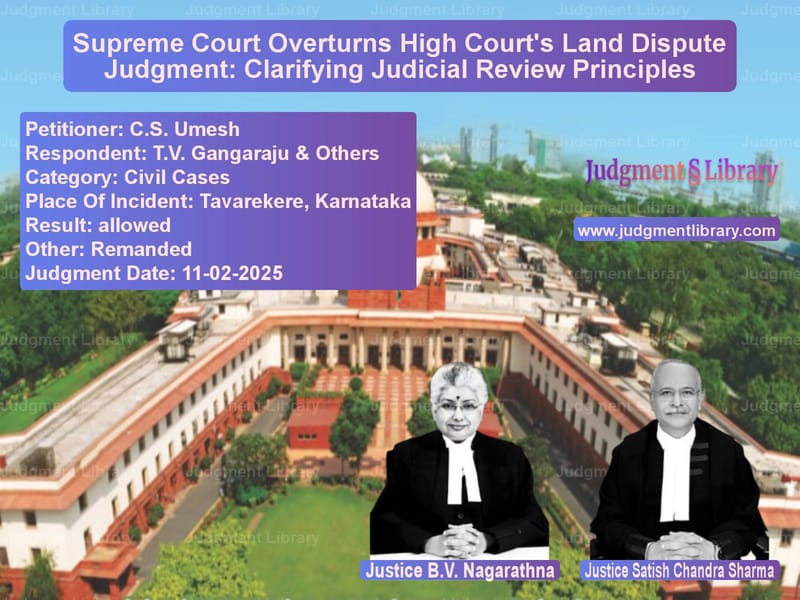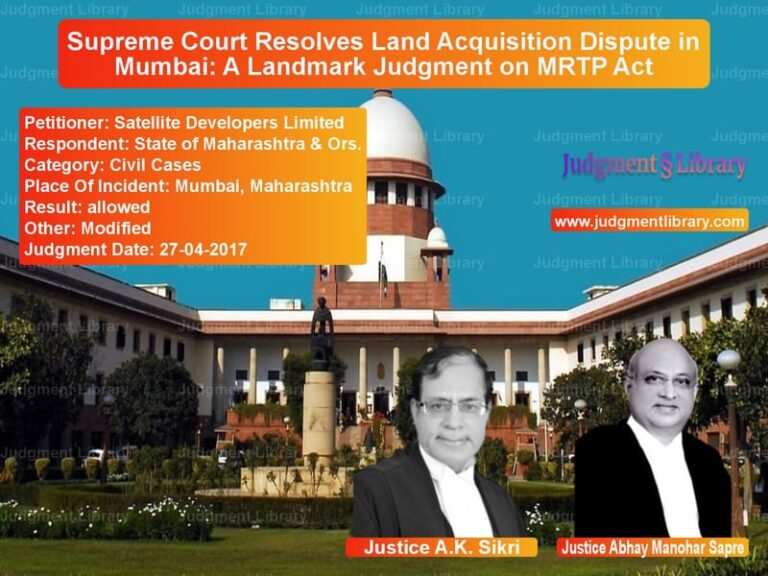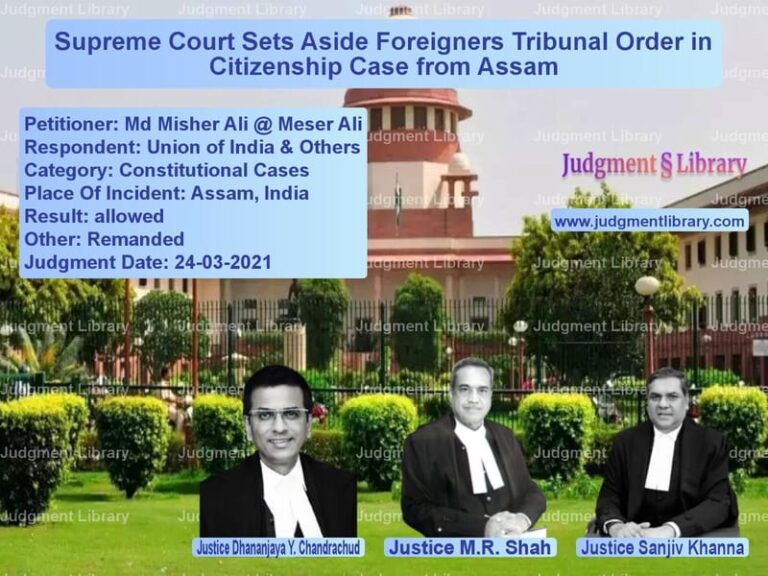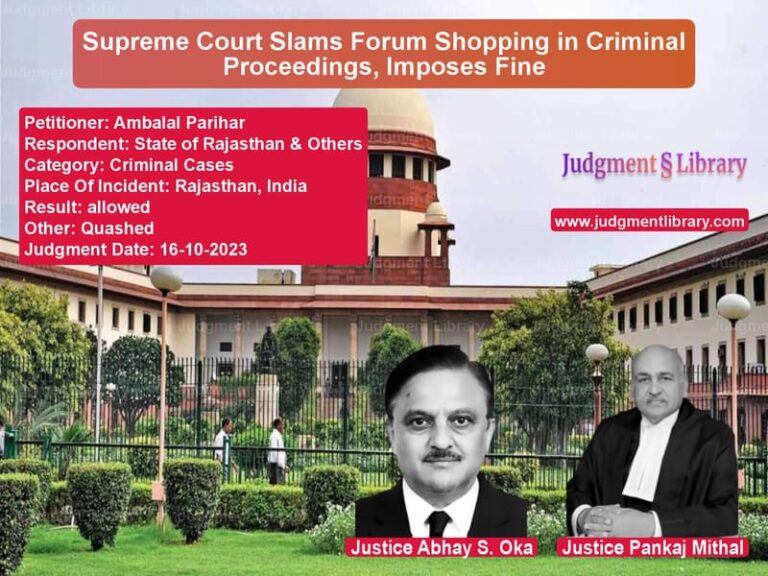Supreme Court Overturns High Court’s Land Dispute Judgment: Clarifying Judicial Review Principles
The Supreme Court of India recently delivered a crucial judgment in a long-standing land dispute under the Karnataka Land Reforms Act, 1961. The case revolved around occupancy rights claimed by the appellant’s father, which were granted by the Land Tribunal but later modified, leading to multiple legal challenges. The Court ultimately ruled in favor of restoring the writ petition to the High Court for fresh adjudication, emphasizing procedural integrity and judicial propriety.
Background of the Case
The dispute originated when the appellant, C.S. Umesh, claimed tenancy rights over 23 acres and 20 guntas of land in Tavarekere village, Magadi Taluk. His father had been cultivating the land as a tenant and was granted occupancy rights by the Land Tribunal in 1981. A certificate of registration of tenancy was issued accordingly.
However, in 2004, the appellant sought a modification of the Tribunal’s order, arguing that the extent of land granted needed correction. The Tribunal rejected the application, stating that it had no authority to modify its own orders. This led to a prolonged legal battle, with the case eventually reaching the Supreme Court.
Key Legal Issues
- Whether the Land Tribunal had the power to modify its previous orders.
- The procedural correctness of rectifications made to the Tribunal’s order by the High Court.
- The validity of oral submissions leading to modifications in judicial orders.
Arguments Presented by the Appellant
The appellant, represented by senior counsel, argued that the Tribunal had wrongly denied his request for rectification. He contended:
“The Land Tribunal failed to recognize that a clerical or typographical error had occurred in its original grant. The correction sought was necessary to reflect the true extent of land under tenancy.”
He further argued that the High Court’s Single Judge had correctly modified the earlier order in 2016 and that the Division Bench’s subsequent ruling had reaffirmed this modification.
Counterarguments by the Respondents
The respondents challenged the procedural validity of the modifications, arguing that they had not been given an opportunity to contest the changes. Their counsel stated:
“The modification to the High Court’s order was done improperly, without any application or notice to the opposing parties. This violates principles of natural justice.”
They further argued that the Tribunal’s original decision should remain undisturbed as it was passed based on proper legal evaluation.
Supreme Court’s Observations
The Supreme Court scrutinized the sequence of legal events and emphasized that judicial orders should not be modified arbitrarily. The Court remarked:
“We take note of the fact that the operative portion of the order dated 25.02.2013 passed by the learned Single Judge is not coherent. However, the ordinary legal recourse was to have filed a review of the said order or to seek clarification.”
The Court expressed concerns over the practice of seeking modifications through oral submissions:
“We deplore such practices of making oral mentions for modification of the orders/judgments in the guise of a review. The hallmark of a judicial pronouncement is its stability and finality. Judicial verdicts are not like sand dunes subject to the vagaries of wind and weather.”
Final Verdict
The Supreme Court set aside the judgments of the Division Bench and the Single Judge of the High Court, restoring the original writ petition for fresh adjudication. The Court ordered:
“In the circumstances, we set aside the judgment of the Division Bench of the High Court passed in W.A.No.683/2018 as well as the order passed in the Review Petition No.535/2019. Consequently, W.P. No.1331/2008 is restored on the file of the High Court.”
The case will now be reconsidered by the High Court with proper procedural adherence.
Significance of the Judgment
This ruling reinforces the importance of procedural integrity in judicial proceedings. It underscores that modifications to court orders must be undertaken through established legal mechanisms rather than informal oral mentions.
Detailed Analysis
The Supreme Court meticulously examined each procedural lapse in the case. The key observations included:
- Improper addition of a sentence in the High Court’s order without notifying the opposing party.
- Failure to follow proper review procedures, which could have clarified the dispute without the need for Supreme Court intervention.
- The necessity of adhering to principles of natural justice before modifying judicial orders.
By restoring the writ petition to the High Court, the Supreme Court has ensured that all parties have a fair opportunity to present their case.
Implications for Future Cases
This judgment sets a precedent that oral modifications to judicial orders should not be entertained without due process. It emphasizes the role of review petitions in correcting errors rather than informal judicial interventions.
Petitioner Name: C.S. Umesh.Respondent Name: T.V. Gangaraju & Others.Judgment By: Justice B.V. Nagarathna, Justice Satish Chandra Sharma.Place Of Incident: Tavarekere, Karnataka.Judgment Date: 11-02-2025.
Don’t miss out on the full details! Download the complete judgment in PDF format below and gain valuable insights instantly!
Download Judgment: c.s.-umesh-vs-t.v.-gangaraju-&-oth-supreme-court-of-india-judgment-dated-11-02-2025.pdf
Directly Download Judgment: Directly download this Judgment
See all petitions in Property Disputes
See all petitions in Landlord-Tenant Disputes
See all petitions in Judgment by B.V. Nagarathna
See all petitions in Judgment by Satish Chandra Sharma
See all petitions in allowed
See all petitions in Remanded
See all petitions in supreme court of India judgments February 2025
See all petitions in 2025 judgments
See all posts in Civil Cases Category
See all allowed petitions in Civil Cases Category
See all Dismissed petitions in Civil Cases Category
See all partially allowed petitions in Civil Cases Category







